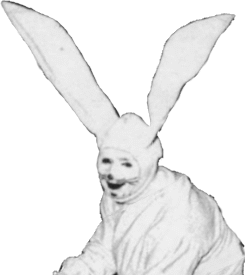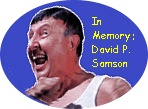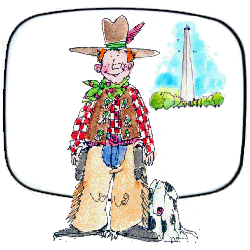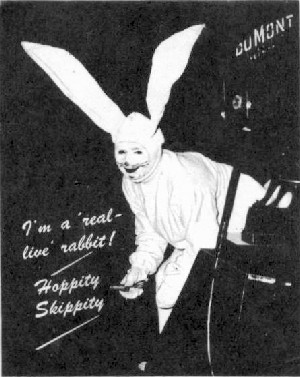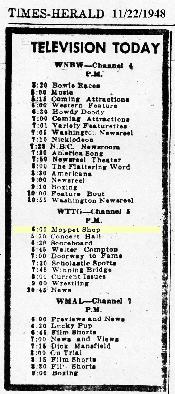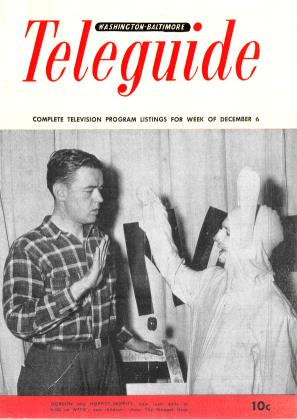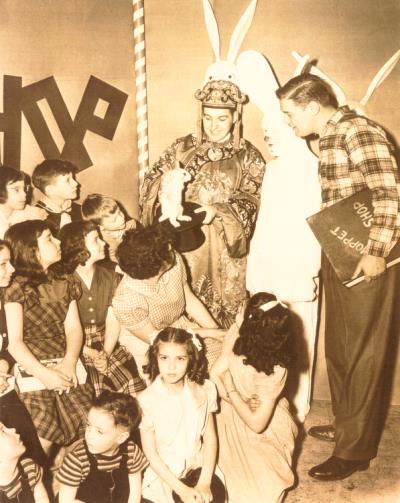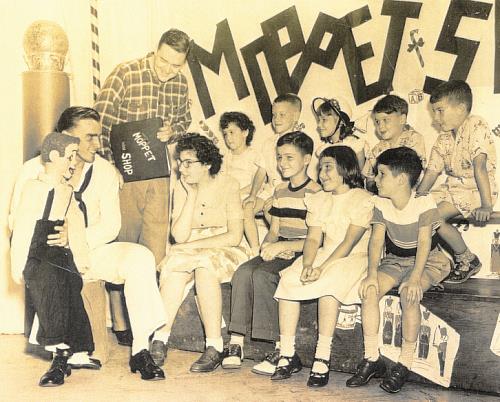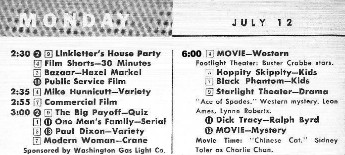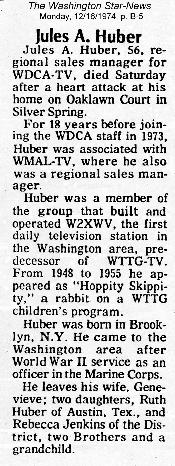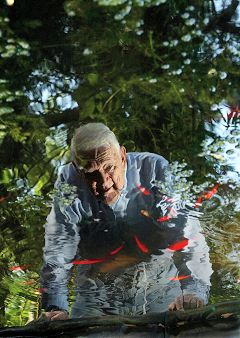How
did this veteran of the Pacific Theater in
World War II become so worked up?
It
is a passion that grew from an adventurous
life.
As
a young singer from just outside Baltimore,
he moved to Florida well before Disney, so he could attend Stetson
University in DeLand. In his words, it was a "natural wonderland"
teeming with unique plants and animals in balance with an environment
so clean he could smell the citrus trees.
He
was into his fourth year at Stetson when he
left, joining the Navy in 1944. He saw action and survived several
close calls.
But
when a wave threw him against a boat, he
suffered nerve damage that he believes caused the tremor that slows him
even today.
Back
in the States, he landed jobs at radio
stations in Annapolis and Washington D.C.
Before
long, he was hired on at WTTG, the first
television station in Washington. He started as a booth announcer,
introducing programs, and became an on-air personality, reading news
and playing the straight man alongside a children's show character
named Hoppity Skippity.
"I
even have people come up to me today and say
they remember the show and were devoted fans," he said. "It was fun to
do."
The
era was a pioneering, fun time, and
Williamson was involved in some groundbreaking moments.
For
instance, he can't remember whether it was
1947 or 1948, but he recalls working as a commentator on the first
broadcast from Capitol Hill, a House Armed Services Committee hearing
involving then-Gen. Dwight David Eisenhower.
Williamson
also played Santa Claus and met such
entertainment giants as Louis Armstrong, Frank Sinatra, Bob Hope, Duke
Ellington and Billie Holiday as they visited the station for live,
on-air performances.
Eventually,
he moved into advertising and
executive positions at television stations and ad agencies in
Greensboro, N.C., Charleston, S.C., and Orlando.
But
while television is a sweet spot of memories
for Williamson, it is also a source of sourness.
"I
think it's lost its soul," he said. "It seems
that anything goes and there's so much deception.
"They
can spin something that's not correct into
something the public believes is true."
As
ownership of most television stations has
fallen into the hands of the same seven or eight conglomerates, the
business has lost much of its originality, he said.
He
and wife Natalie Dix, the retired Daytona
Beach News-Journal editorial page editor (who first met Williamson at
Stetson in the 1940s), limit their viewing to mainly news-oriented
programs and Comedy Central's "The Daily Show with Jon Stewart."
Instead,
he spends a lot of time admiring the
mostly wild plants and flowers that provide cover for his home.
"I
believe cutting trees is responsible for
other problems we have today. We bare too much land and it allows the
sun to dry it out and reduces our evaporation."
He's
convinced deforestation has altered the
state's climate, raising temperatures. "We seldom hit 90," in the
1940s, he said.
Politically,
he had embraced the conservative
message of Barry Goldwater in the 1960s, but he returned to Florida in
1970 and his concern for the environment grew. He switched to the
Democratic Party in the late 1980s.
Williamson
volunteered for environmentalist Reid
Hughes, a Democratic candidate for Congress in 1982 and 1990. Hughes
said his background in television and radio was invaluable to his
campaigns, though Hughes lost close races to incumbents both times.
"He
works harder than the rest of us," Hughes
said. "He has been an inspiration to the environmental constituency
with his leadership."
Another
cause Williamson took up was
overpopulation and its societal and environmental effects. For years,
he traveled the state, giving presentations on the problem.
But
the message never seemed to catch on.
"I
think I'm more disillusioned by the human
condition than anything else," he said. "I think I'm frustrated because
in Florida, we're continuing to do the things that are not good for us.
"I'm
a pessimist, I guess, and I hate to be a
pessimist. I look across the world and I see people starving and I see
genocide and what's going on in Iraq and Palestine and I'm frustrated
that I can't do anything about it."
Williamson
insists his anger has little or
nothing to do with his family life. He was married once, and divorced,
and has not spoken to his adopted son for many years.
He
stays busy. He travels and continues
strategizing with groups such as the Volusia-Flagler Environmental
Action Council. He talks about finishing his life story.
In
quiet moments at home, he admires the lizards
he claims drink from a manmade pond he had dug in his backyard in Holly
Hill, an otherwise largely urban city. He watches the koi.
He
notices an air potato vine growing on one of
his palm trees, and thinks to himself, "Gee, I've got to get that taken
care of."
He
tries to steady that tremor.
Copyright
© 2004
News-Journal Corporation
